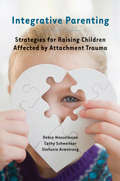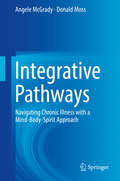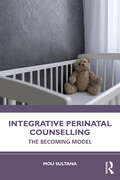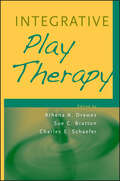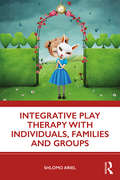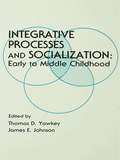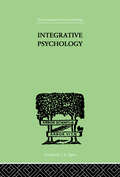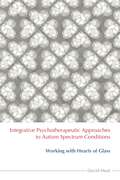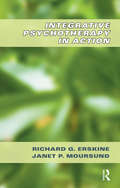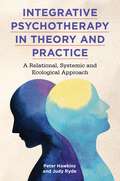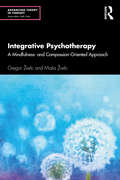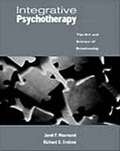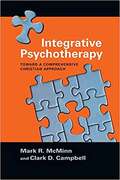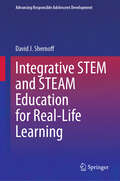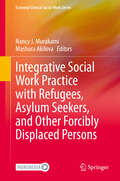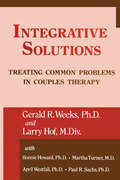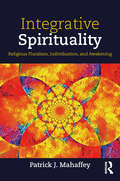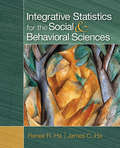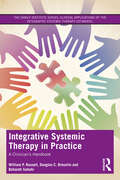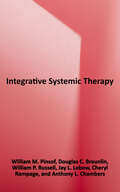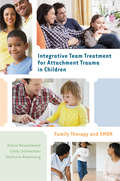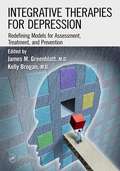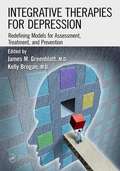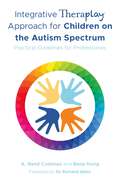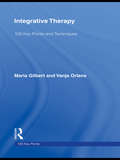- Table View
- List View
Integrative Parenting: Strategies for Raising Children Affected by Attachment Trauma
by Cathy Schweitzer Debra Wesselmann Stefanie ArmstrongAn accompanying parent's guide filled with effective techniques to help challenging children with traumatic pasts. Designed as a manual to complement the clinician's guide, this book is written for birth, foster, or adoptive parents, aunts and uncles, grandparents, or anyone who may be raising a child who has experienced attachment loss and trauma. Their severe behaviors can often leave caregivers feeling confused, frightened, hurt, and overwhelmed, as they struggle to make sense of a massive amount of information--and misinformation--that exists on attachment issues. This book provides understanding, validation, and solutions for these caregivers. In it, the authors explain their innovative model of "team" treatment that includes an EMDR therapist and a family therapist. Best used in conjunction with therapeutic help, it walks readers through an array of parenting strategies that will lead them to a deeper understanding of their traumatized child, and better enable them to calm their behavior and improve their attachment security so they can heal.
Integrative Pathways: Navigating Chronic Illness with a Mind-Body-Spirit Approach
by Donald Moss Angele McGradyThis expansive text offers a comprehensive mind/body/spirit framework for relieving individual patients of the debilitating effects of long-term disease while reducing the public burden of chronic illness. It introduces the patient-centered Pathways Model, featuring a robust scientific base for psychotherapy, complementary and alternative modalities, and a religious/spiritual element, in progressive levels of treatment from self-help to professional help. Chapters spotlight component skills of the model, including treatment planning, patient rapport, and choosing therapies for optimal well-being. The authors advocate for interventions ranging from lifestyle change to mindfulness, and biofeedback to pastoral counseling. In addition, in-depth case studies detail memorable patient journeys from diagnosis and referral to assessment, engagement in treatment and outcome. Among the topics covered: · Mind, body, and spirit in chronic illness.· The need for an integrative model to support comprehensive health-supportive change.· Chronic disease from a functional medicine perspective.· Mechanisms by which religious engagement and religion-based variables affect health.· Complementary and integrative medicine for the Pathways Model.· PLUS: Pathways approaches to chronic pain, caregiver stress, diabetes, mood disorders, PTSD, brain injury, heart disease, cancer, and more. Emphasizing patient individuality and clinician creativity, Integrative Pathways models a compassionate approach to lessening persistent suffering for use by health psychologists, physicians, counselors, health coaches, and other practitioners involved in complementary and integrative medicine, pain medicine, and rehabilitation. “The Pathway Model addresses what clinical researchers in the field have been calling for, a research-based approach to health and wellness that clearly explains important concepts and provides an optimal foundation from which to approach health interventions.”Patrick R. Steffen, PhD, BCB, Brigham Young University
Integrative Perinatal Counselling: The Becoming Model
by Mou SultanaThis book presents “the Becoming Model”, an integrative perinatal counselling model that provides a practical clinical framework to therapists working with those for whom the question of becoming a parent seems central. Becoming a parent changes your identity, household, worldviews, relationships, priorities and previous life goals. Based on the notion that one does not become a mother or a father overnight, rather that it is a process of “becoming”, this model provides a roadmap for therapists (psychoanalytic, behavioural, humanistic, integrative and others) looking to understand and explore their client’s experience of this transitional journey through talk-therapy. It defines the unique field of perinatal counselling, highlights major clinical considerations, presents clinical observations by drawing from real-life cases and provides the therapist with one-stop-information guides on each theme (ten) and sub-theme (40) by drawing from existing research i.e. evidence-based practice. Arguably one of the few counselling models specific to the perinatal period, this user-friendly guide, which is applicable to any modality, is designed to support psychotherapists, counsellors, nurses, midwives, and other mental health professionals working therapeutically with those who are going through the pre- or peri-natal period, or those who have experienced perinatal loss.
Integrative Play Therapy
by Charles E. Schaefer Athena A. Drewes Sue C. BrattonAn integrative approach to play therapy blending various therapeutic treatment models and techniquesReflecting the transition in the field of play therapy from a "one size fits all" approach to a more eclectic framework that integrates more than one perspective, Integrative Play Therapy explores methods for blending the best theories and treatment techniques to resolve the most common psychological disorders of childhood.Edited by internationally renowned leaders in the field, this book is the first of its kind to look at the use of a multi-theoretical framework as a foundation for practice.With discussion of integrative play treatment of children presenting a wide variety of problems and disorders-including aggression issues, the effects of trauma, ADHD, anxiety, obsessive-compulsive disorders, social skills deficits, medical issues such as HIV/AIDS, and more-the book provides guidance on: Play and group therapy approaches Child-directed play therapy with behavior management training for parents Therapist-led and child-led play therapies Cognitive-behavioral therapy with therapeutic storytelling and play therapy Family therapy and play therapy Bibliotherapy within play therapyAn essential resource for all mental health professionals looking to incorporate play therapy into treatment, Integrative Play Therapy reveals unique flexibility in integrating theory and techniques, allowing practitioners to offer their clients the best treatment for specific presenting problems.
Integrative Play Therapy with Individuals, Families and Groups
by Shlomo ArielIntegrative Play Therapy with Individuals, Families and Groups is a complete theory-to-practice introduction to a comprehensive integrative model of play therapy, developed by Shlomo Ariel. It synthesizes numerous concepts, methods and techniques found in the various branches of play theory and research under a unified conceptual and linguistic roof of information-processing, cybernetics and semiotics. The author's tenet is that any case, whatever the presenting difficulties, can be treated by such an integrative, multi-systemic approach. This book abounds with vivid observations and case descriptions, followed by discussions in a fictional inter-disciplinary seminar. Every chapter is followed by a brief summary, homework assignments and a classified list of relevant publications. Integrative Play Therapy with Individuals, Families and Groups will generate immense interest throughout the play therapy community. It can serve as a textbook for budding play therapists and as a reference book for more experienced practitioners.
Integrative Processes and Socialization: Early To Middle Childhood
by James E. Johnson Thomas D. YawkeyThis book provides insight into the complex nature of socialization and development by exploring the interrelations among such topics as play, diet, social cognition, self-concept, friendship, family, and school. This book also examines the contributions and impact of intrapersonal and interpersonal integration on a child's psychological development from early to middle childhood levels.
Integrative Psychology: A STUDY OF UNIT RESPONSE (International Library Of Psychology Ser.)
by Marston, William M & King, C Daly & Marston, Elizabeth HFirst Published in 1999. This text is the author's attempt to orgnaise the field of psychology for students. This volume make a critical examination of various psychological and semi-pstchological attempts to classify fundamental human activities; and thereafter attempts to postulate elementary behaviour units which may serve psychology precisely as the atom and electron have served in chemistry.
Integrative Psychotherapeutic Approaches to Autism Spectrum Conditions: Working with Hearts of Glass
by David MoatPeople on the autism spectrum often present with symptoms indicating poor self-awareness or hyper-awareness, low self-esteem, depression and difficulty connecting with others. Treatment which relies on medical and behavioural views of autism risks ignoring emotional factors. This book demonstrates that counselling and emotional support is not only possible for people on the autism spectrum, but essential. David Moat describes the impact of autism on emotional perception and regulation, and looks at how various therapeutic principles can helpfully be applied to address these issues. He identifies strategies for dealing with common emotional difficulties, including anxiety, anger and depression, as well as techniques for aiding relaxation. Specific approaches to use as part of holistic care are described, including play therapy, the use of imagery and story-making, hypnotherapy, intensive interaction, Neuro-Linguistic Programming, Cognitive Behavioural Therapy and positive psychology. This is essential reading for all those working therapeutically with people on the autism spectrum, including counsellors, therapists and psychologists, as well as parents.
Integrative Psychotherapy in Action
by Richard G. ErskineWhat is integrative psychotherapy? How effective is the integrative approach to therapy? And what are its limitations? Answering these and other significant questions, this insightful volume provides the working clinician with a practical guide to using an integrative approach to psychotherapy. Erskine and Moursund, both experienced psychotherapists, begin their discussion with a masterful theoretical overview which integrates diverse concepts from various therapy techniques such as psychoanalysis, client-centred therapy, and Gestalt therapy. The authors then use transcripts of actual therapeutic sessions (with explanatory comments interjected) to provide the reader with a broader understanding of both theory and its application in therapy - and to capture some of the elusive essence of the ongoing therapy interview. Unique in its attention to detail, as well as to the therapist's own decision-making process, advanced students and therapists alike will find this volume an invaluable resource.
Integrative Psychotherapy in Theory and Practice: A Relational, Systemic and Ecological Approach
by Peter Hawkins Judy RydeBringing together relational, systemic and ecological approaches, this pioneering book outlines a valuable integrative psychotherapeutic method and presents the core steps for implementing it into practice.The book provides a robust examination of the historical roots and theoretical underpinnings of the approach, alongside insights from contemporary neuroscience. The authors also offer a clear framework for carrying out integrative work, weaving together relational, systemic and ecological threads. Case studies highlight the practical applications of the method, and chapters on practice, ethics, supervision, and training provide a springboard for psychotherapy and counselling professionals and students to take forward the lessons offered and implement them in practice.
Integrative Psychotherapy: A Mindfulness- and Compassion-Oriented Approach (Advancing Theory in Therapy)
by Gregor Žvelc Maša ŽvelcIntegrative psychotherapy is a groundbreaking book where the authors present mindfulness- and compassion-oriented integrative psychotherapy (MCIP) as an integration of relational psychotherapy with the practice and research of mindfulness and compassion. The book elucidates an approach which is holistic and based on evidence-based processes of change related to the main dimensions of human experience. In this approach, mindfulness and compassion are viewed as meta-processes of change that are used within an attuned therapeutic relationship to create a powerful therapeutic model that provides transformation and growth. The authors offer an exciting perspective on intersubjective physiology and the mutual connection between the client’s and therapist’s autonomic nervous systems. Comprised of creatively applied research, the book will have an international appeal amongst psychotherapists/counsellors from different psychotherapy traditions and also students with advanced/postgraduate levels of experience.
Integrative Psychotherapy: The Art and Science of Relationship (Skills, Techniques, & Process)
by Richard G. Erskine Janet P. MoursundSuitable for students of both counseling and clinical psychology, this clearly written and readable description of integrative psychotherapy/counseling focuses on the central role of the therapeutic relationship, and of relationships in general, both in the healing process and in maintaining a psychologically healthy life. It posits that the therapeutic relationship is key to helping clients become integrated or whole. The work can be divided into three parts: Theoretical Foundations, Therapeutic Practice, and Transcript (a full, verbatim transcript of a therapy session). A linkage index provides links between concepts covered in the text and applications as demonstrated in the transcript.
Integrative Psychotherapy: Toward A Comprehensive Christian Approach (Christian Association For Psychological Studies Partnership)
by Mark R. McMinn Clark D. CampbellMark McMinn and Clark Campbell present an integrative model of psychotherapy that is grounded in Christian biblical and theological teaching and in a critical and constructive engagement with contemporary psychology. Now in paperback, this foundational work integrates behavioral, cognitive, and interpersonal models of therapy within a Christian theological framework. Not only do the authors integrate Christian faith and spirituality with the latest thinking in behavioral science at a theoretical level, they also integrate the theoretical and academic with the pastoral and clinical, offering a practical guide for the practitioner.
Integrative STEM and STEAM Education for Real-Life Learning (Advancing Responsible Adolescent Development)
by David J. ShernoffThis book illustrates that real-life learning in which students conduct scientific investigations and make new innovations to solve real-world problems is an integral part of STEM (science, technology, engineering, math) and STEAM (science, technology, engineering, art, math) education. It provides examples of student and teacher work from projects of the Rutgers University Center of Mathematics, Science, and Computer Education. The book examines how new K to 12 education standards and innovative teacher professional development programs – which emphasize transdisciplinary approaches to STEM and STEAM – lead to the emergence of real-life education in schools. In addition, the book references related research to identify key advances in STEM and STEAM education. Special topics include the uses of makerspaces, educational video games, artificial intelligence (AI), and machine learning to fuel project-based, real-life learning. Key areas of coverage include: the role of new K-12 standards in science, design thinking, computer science, and climate change in stimulating integrative STEM/STEAM education; obstacles and supports for teaching integrative STEM programs; modes of collaboration in STEM, STEAM, and maker-based education; and the importance of teacher professional development to promote transdisciplinary learning. Integrative STEM and STEAM Education for Real-Life Learning is an essential resource for researchers, professors, college students, as well as educational leaders and policy makers with interests in the STEM and STEAM disciplines, psychology, teaching and teacher education, library science, and multimedia. “A must-read for anyone committed to the future of education. This book is not only thought-provoking; it is a guide to action, offering a compelling approach that empowers youth and educators alike.” Dr. Margaret Honey, President and CEO, Scratch Foundation “David J. Shernoff, a leading expert in the field, explores how integrative approaches in STEM and STEAM are not just about preparing students for the future, but engaging them in solving real-world problems today…this book demonstrates how education can empower students to become active, innovative contributors to society.” Cassie Quigley, author of Educator’s Guide to STEAM Education
Integrative Social Work Practice with Refugees, Asylum Seekers, and Other Forcibly Displaced Persons (Essential Clinical Social Work Series)
by Nancy J. Murakami Mashura AkilovaThis textbook provides theoretical and clinical knowledge needed by social workers and other practitioners involved in humanitarian emergency response. Social workers are well positioned to serve coordinating and leadership roles in this interdisciplinary field due to their holistic training. This book weaves together micro, mezzo, and macro levels of practice into integrated social work practice. Its historical account of humanitarian emergencies, coverage of social work frameworks and principles, and review of existing best practices at the clinical, community, and policy levels ground the reader in a field of social work that requires consideration of historical frameworks alongside innovative responses to the complexity of humanitarian emergencies.The contributors incorporate best practices as well as address gaps in awareness, knowledge, and skills that they have observed and studied worldwide. Some of the topics explored include:Social Work with Displaced Children, Women, LGBTQI+, Asylum SeekersReturn and Reintegration of Displaced Populations and Reconstruction in Post-conflict SocietiesCulture, Trauma, and Loss: Integrative Social Work Practice with Refugees and Asylum SeekersClinical Social Work Practice with Forcibly Displaced Persons Grounded in Human Rights and Social Justice PrinciplesIntegrative Social Work Practice with Refugees, Asylum Seekers, and Other Forcibly Displaced Persons is adoptable as a primary text for MSW and doctoral elective courses on global social work or international social work practice with persecuted and forcibly displaced people. This textbook is targeted to clinical social work or policy courses as well, and can be supplemental reading for required courses for migration and forced displacement majors. It is also useful for social workers or interdisciplinary practitioners working around the globe with displaced populations.
Integrative Solutions: Treating Common Problems In Couples Therapy
by Gerald R. Weeks Larry Hoff Martha with Turner Bonnie Bellamy HowardFirst published in 1996. This books presents a problem-solving model of marriage and couples therapy called the Intersystem Model, which assesses and treats couples' problems from individual, interactional, and intergenerational perspectives. The authors address problems of commitment, intimacy, anger, and conflict, and the complexities relating to the treatment of depression: addictions and extramarital sexuality, marital adjustments to aging, and problems of inhibited sexual desire. They suggest techniques therapists can use to resolve problems that may occur in couples therapy and ways couple can move toward a higher level of functioning and personal growth.
Integrative Spirituality: Religious Pluralism, Individuation, and Awakening
by Patrick J. MahaffeyIn Integrative Spirituality, Patrick J. Mahaffey elucidates spirituality as a developmental process that is enhanced by integrating the teachings and practices of multiple religious traditions, Jungian depth psychology, and contemplative yoga. In the postmodern world of religious pluralism, Mahaffey compellingly argues that each of us must fashion a unique path to wholeness which integrates aspects of life and of the self that have become disconnected and disowned. Integrative Spirituality uniquely conjoins four components: exemplary religious pluralists from three traditions, individuation, the forms of contemplative Hindu yoga that have been successfully transmitted to the West, and a presentation of two models for integrating psychological growth and spiritual awakening. The book presents pioneering practitioners in each field who exemplify how we may fashion our own approach to integrating both spiritual awakening and psychological development and delineates an array of spiritual practices that integrate the somatic, psychological, interpersonal, and spiritual aspects of life. Ultimately, Mahaffey contends that integrative spirituality is a mode of being that fully embraces the divinity inherent in each of us and in the world. Integrative Spirituality will be essential reading for academics and students of Jungian and post-Jungian studies, transpersonal and Jungian psychology, and religious studies and contemplative education. It will also be of interest to analytical and depth psychologists in practice and in training, and to anyone seeking a greater understanding of spirituality, psychological growth, religious traditions, individuation, and contemplative yoga.
Integrative Statistics for the Social and Behavioral Sciences
by Renee R. Ha James C. HaDesigned to engage students and lower their "fear factor", Integrative Statistics for the Social and Behavioral Sciences is a concise, user-friendly text that prepares students to use statistics in the real world. Providing depth and breadth of statistical tests, the text focuses on choosing the appropriate statistical analysis, and shows how to interpret the output and present the results.
Integrative Systemic Therapy in Practice: A Clinician’s Handbook (The Family Institute Series)
by William Russell Douglas C. Breunlin Bahareh SahebiThis essential handbook provides clinicians with the tools to introduce Integrative Systemic Therapy (IST) into their practice working with individuals, couples, and families. Describing the "how to" and "how to decide what to do" aspects of IST, this book outlines a practical, problem-solving approach that considers client strengths and and cultural contexts in the process of integrating interventions from various therapy models and empirically supported treatments. Chapters demonstrate how problem-solving tasks can be accomplished using the IST blueprint for therapy and include scenarios that will challenge the reader to think through the specific steps for IST, encouraging them to consider the therapeutic alliance and the use of self in therapy. For supervisors, trainers, and clinicians familiar with IST, this book will enrich and deepen their understanding of it. The book is also relevant for clinicians and supervisors of all types of therapy who seek to become more integrative and systemic in their work.
Integrative Systemic Therapy: Metaframeworks for Problem Solving with Individuals, Couples, and Families
by Jay L. Lebow Douglas C. Breunlin William M. Pinsof William P. Russell Cheryl Rampage Anthony L. ChambersThis book offers a set of templates that enable therapists to navigate the course of therapy, as well as a treasure trove of case examples to illustrate how therapists can use the IST perspective to treat a wide variety of challenging problems. Many psychotherapists today work in agencies where they see individuals, couples, and families from a variety of backgrounds who present with a broad range of problems. Integrative Systemic Therapy (IST) is a framework for these professionals, whether they are training in the basics of therapy or are well-established in their careers. <p><p>IST provides early-career therapists with a framework that guides their work and facilitates lifelong learning. It provides established therapists the opportunity to think outside the box of their established practice, using tools that facilitate more comprehensive care. IST encourages a focused and efficient approach to problem-solving. It offers the means to continually assess the full complement of factors--psychological, biological, interactional, and cultural--that impact clients and their concerns. IST's blueprint for decision-making in therapy encourages practitioners to draw upon the valuable strategies of various theoretical models and empirically supported treatments.
Integrative Team Treatment for Attachment Trauma in Children: Family Therapy and EMDR
by Cathy Schweitzer Debra Wesselmann Stefanie ArmstrongA practical guide to treating children suffering from early attachment trauma. Loss of a parent, separations, abuse, neglect, or a history of a difficult foster or orphanage experience can lead to profound emotional dysregulation and mistrust in children. Working with these children--many of whom have experienced multiple traumas and losses--can feel overwhelming. Clinicians must navigate complex case management decisions and referrals, address the needs of parents and schools, not to mention ameliorate the traumatic memories and severe behaviors that present in the kids. But by working as a collaborative team, EMDR and family therapists can, together, strengthen the parent-child attachment bond and help to mend the early experiences that drive the child's behavior. This book, and its accompanying Parent Manual, are intended to serve as clear and practical treatment guides, presenting the philosophy and step-by-step protocols behind the Integrative Team Treatment approach, so both the family system issues and the child's traumatic past are effectively addressed. You need not be a center specializing in attachment trauma to implement this team model, nor must members of the team practice at the same location. With at least one fully-trained EMDR practitioners as part of the two-person team, any clinician can pair with another to implement this treatment approach, and heal children suffering from attachment trauma.
Integrative Therapies for Depression: Redefining Models for Assessment, Treatment and Prevention
by James M. Greenblatt Kelly BroganIntegrative Therapies for Depression: Redefining Models for Assessment, Treatment and Prevention summarizes emerging theories and research findings on various nonpharmaceutical therapies to treat mood disorders.Supported by the review of nearly 3000 scientific studies, the book describes the concepts of inflammation, genetics, hormonal imbalance, g
Integrative Therapies for Depression: Redefining Models for Assessment, Treatment, and Prevention
by James M. Greenblatt Kelly BroganSupported by the review of nearly 3000 scientific studies, the book describes the concepts of inflammation, genetics, hormonal imbalance, gastrointestinal conditions, environmental stress, and nutritional deficiencies and their possible link to the pathogenesis of mood disorders. It also examines findings on various nonpharmaceutical therapies used to treat mood disorders including vitamins, botanicals, and other natural products as well as exercise, stress reduction, bright light, mind-body practices, and spiritual approaches. Also covered are evidence-based approaches to integrative management of mood disorders in pregnant women, adolescents, and the elderly. Separating facts from fiction, the book provides practical information that clinicians can implement and share with their patients. The book fills a significant gap in the conventional model of therapeutics for mood disorders. It is a valuable resource for psychiatrists, psychologists, family therapists, and all other clinicians who devote their days to caring for those afflicted with depression.
Integrative Theraplay® Approach for Children on the Autism Spectrum: Practical Guidelines for Professionals (Theraplay® Books & Resources)
by Rana Hong A. Rand ColemanCommunication and social skills are a key challenge for children on the autism spectrum, and a fundamental priority for care professionals to support their clients' progress. Using case studies and evidence-based advice, this book guides readers through an integrated Theraplay® approach to helping young people on the autism spectrum. The interventions emphasise interactivity and fun to help children build social and emotional skills through play. From using balloons to encourage eye contact to turn-taking play for fostering social awareness, each Theraplay® activity is tailored to support children on the autism spectrum and includes suggestions for further adaptations to suit each child's unique needs. Parents' and guardians' needs are also addressed in the context of Theraplay®, examining common sources of frustration and providing advice on effective treatment plans. Officially supported by the Theraplay® Institute, this handbook guides readers towards a thoughtful, focused application of Theraplay® to support children on the autism spectrum.
Integrative Therapy: 100 Key Points and Techniques (100 Key Points)
by Vanja Orlans Maria GilbertIntegrative Therapy is a unifying approach that brings together physiological, affective, cognitive, contextual and behavioural systems, creating a multi-dimensional relational framework that can be created anew for each individual case. Integrative Therapy: 100 Key Points and Techniques provides a concise and accessible guide that allows professionals and students to look beyond specific approaches in order to draw upon ideas and techniques that will best help the client. Divided into helpful sections, areas of discussion include: the case for an integrative approach to therapy the centrality of relationship and dimensions of self development the process of integrative therapy techniques and strategies This book will be essential reading for all psychotherapists and counsellors, both in practice and training, who want to expand their perspectives and learn more about an integrative approach.
